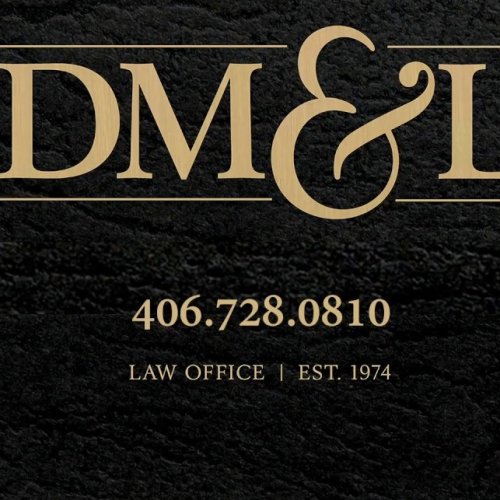Best Real Estate Lawyers in Montana
Share your needs with us, get contacted by law firms.
Free. Takes 2 min.
Free Guide to Hiring a Real Estate Lawyer
Or refine your search by selecting a city:
List of the best lawyers in Montana, United States
United States Real Estate Legal Questions answered by Lawyers
Browse our 2 legal questions about Real Estate in United States and read the lawyer answers, or ask your own questions for free.
- What is owner of condo units obligation as far as damage to the condo below their unit.
- The unit above my condo is managed by a Property Management company, and it was rented. During the time it was rented, there were water leaks that damaged my ceilings, and the Management Company. refuses to fix the ceiling so that it matches the rest of the ceiling. Even though... Read more →
-
Lawyer answer by Horus Legal Sulotion
Thank you for sharing the details of your situation. Based on the circumstances you described, you may have grounds to escalate the matter legally. You can file a case to request the appointment of a government engineer from Dubai Municipality...
Read full answer - What's the fee for reviewing a Home purchase contract.
- How much is your fee for looking over a contract on the house I am about to purchase.
-
Lawyer answer by US Legal Group 美国法律集团律师事务所
Hi. Thank you for reaching out to us regarding your upcoming property purchase. As a combined China & U.S. law firm, we specialize in real estate transactions and are well-equipped to review your contract.To provide you with a precise quote,...
Read full answer
United States Real Estate Legal Articles
Browse our 4 legal articles about Real Estate in United States written by expert lawyers.
- NY Lease Audits 2026: Mixed-Use Liabilities
- Commercial real estate in the United States is governed mainly by state law, but federal rules on discrimination, financing, and taxation still shape how you invest, lease, and manage property. For mixed-use buildings in New York City, new "Good Cause Eviction" style protections for certain residential tenants can cap rent... Read more →
- NYC Local Law 97 Fines: Defend Owners 2026
- Starting in 2026, New York City will begin collecting Local Law 97 emissions fines for buildings that exceeded their 2024 limits, at $268 per metric ton of CO2-equivalent over the cap. Owners can significantly reduce or defer penalties by documenting "Good Faith Efforts," including signed retrofit contracts, permits, financing commitments,... Read more →
- Squatters Rights in Texas 2026:How New Laws Expedite Removal
- Real estate law in the United States is mostly state based, but key federal laws like the Fair Housing Act and RESPA still shape every sale, lease, and loan. Title, deeds, and recording with the county clerk or recorder are what legally prove who owns a property and who has... Read more →
About Real Estate Law in Montana, United States
Real estate law in Montana covers the rights and responsibilities related to owning, buying, selling, and leasing property within the state. Montana's real estate market is diverse, featuring everything from urban properties in cities like Billings and Bozeman to large rural parcels and ranches. The legal framework governing real estate transactions in Montana is shaped by both state-specific statutes and the federal laws that affect property rights, transactions, land use, landlord-tenant relationships, and financing. Anyone dealing with property in Montana should be familiar with the basics of state law and aware of the unique aspects of real estate in this region.
Why You May Need a Lawyer
There are many situations where a real estate lawyer can help protect your interests and ensure your transaction runs smoothly in Montana. Some common scenarios include:
- Reviewing or drafting purchase agreements and sales contracts
- Assisting with title searches and resolving title disputes
- Handling complex transactions, including commercial or agricultural property
- Representing clients in real estate litigation, such as boundary disputes, easements, or adverse possession claims
- Advising on zoning, land use, or environmental regulations
- Helping landlords or tenants with lease agreements and eviction proceedings
- Navigating issues related to property taxes or liens
- Assisting with property transfers in divorce or estate matters
Having legal guidance can prevent mistakes, reduce the risk of costly future disputes, and safeguard your investment in Montana’s real estate market.
Local Laws Overview
Montana has several unique laws and regulations that are especially important for anyone involved in real estate transactions:
- Disclosure Requirements: Sellers must disclose known material defects about a property, especially if these issues would substantially affect its value or desirability.
- Water Rights: Water use is heavily regulated in Montana. Ownership of land does not automatically grant the right to use water, and water rights can be complex, especially for agricultural and rural properties.
- Landlord-Tenant Law: The Montana Residential Landlord and Tenant Act establishes rules for leases, deposits, repairs, and eviction procedures, with specific protections for both landlords and tenants.
- Zoning and Land Use: Local governments have zoning regulations that affect how property can be used. Rural areas often have fewer zoning restrictions than urban locations.
- Homestead Exemption: Homeowners in Montana can protect a certain amount of equity in their primary residence from creditors through the state’s homestead exemption laws.
- Property Taxes: Montana’s property tax system is based on assessed value, with local governments levying taxes to fund schools and services. Understanding these taxes is essential for buyers and owners.
Because Montana’s real estate environment includes unique considerations, such as large ranches and issues with mineral or timber rights, consulting with a knowledgeable local attorney is often important.
Frequently Asked Questions
How do I buy a home or land in Montana?
The process typically involves making an offer, negotiating terms, completing inspections, securing financing, conducting a title search, and closing the sale. Working with a real estate agent and attorney can help navigate these steps smoothly.
Are home sellers required to disclose problems with the property?
Yes. Montana law requires sellers to disclose known material defects that could affect the value or safety of the property. This applies whether you are selling a home, land, or commercial property.
What is a title search, and why is it important?
A title search checks the history of a property to confirm legal ownership and to identify any claims, mortgages, liens, or disputes that could affect the transfer of ownership. It is essential to ensure you receive clear title.
What should I know about water rights in Montana?
Water rights are separate from land ownership in Montana. They are highly regulated, particularly for agricultural or rural properties. Verify water rights before purchasing and don’t assume rights automatically come with the land.
How does landlord-tenant law work in Montana?
Montana law sets out specific rules for leases, deposits, habitability, notice requirements, and eviction procedures. Both landlords and tenants have rights and obligations under the Montana Residential Landlord and Tenant Act.
Can I buy property if I am not a Montana resident?
Yes. Both U.S. citizens and foreign nationals can buy property in Montana. However, consultation with legal and tax professionals is recommended, especially for non-residents.
What is adverse possession, and does it apply in Montana?
Adverse possession allows someone to gain legal title to land under certain conditions if they occupy and use it openly, continuously, and without permission for a specified period (typically 5 to 10 years). Consult a lawyer for details.
Are there special considerations for buying ranches or rural property?
Yes. Rural transactions often involve issues such as access (easements), water rights, mineral or timber rights, fence laws, and property boundaries. Due diligence and legal review are strongly advised.
How are property taxes determined in Montana?
Property taxes are based on the assessed value of your property. Local governments and school districts set the specific rates. Taxes help fund community services and are payable annually.
What happens if there is a dispute over a property boundary?
Boundary disputes can be resolved through negotiation, mediation, or court action if necessary. Montana law recognizes various legal doctrines for settling these disputes, and professional surveys are often crucial.
Additional Resources
If you need more information or assistance related to real estate in Montana, consider these helpful resources:
- Montana Department of Revenue - Property Assessment Division handles property tax and assessment questions.
- Montana Board of Realty Regulation oversees real estate agents and licensing issues.
- Montana Legal Services Association provides legal aid for qualified individuals.
- Local county clerk and recorder offices for property records and deeds.
- Local bar associations for referrals to qualified real estate attorneys.
Next Steps
If you are facing a legal issue or planning a real estate transaction in Montana, consider the following steps:
- Gather all relevant documents, such as deeds, contracts, surveys, or correspondence.
- Make a list of your questions and concerns.
- Consult a licensed Montana real estate attorney for advice specific to your situation.
- If buying or selling, work with a licensed real estate agent familiar with local laws and practices.
- Use official governmental or professional resources to learn more about your rights and responsibilities.
A qualified attorney can provide personalized guidance, help you avoid pitfalls, and represent your interests throughout the real estate process in Montana.
Lawzana helps you find the best lawyers and law firms in Montana through a curated and pre-screened list of qualified legal professionals. Our platform offers rankings and detailed profiles of attorneys and law firms, allowing you to compare based on practice areas, including Real Estate, experience, and client feedback.
Each profile includes a description of the firm's areas of practice, client reviews, team members and partners, year of establishment, spoken languages, office locations, contact information, social media presence, and any published articles or resources. Most firms on our platform speak English and are experienced in both local and international legal matters.
Get a quote from top-rated law firms in Montana, United States — quickly, securely, and without unnecessary hassle.
Disclaimer:
The information provided on this page is for general informational purposes only and does not constitute legal advice. While we strive to ensure the accuracy and relevance of the content, legal information may change over time, and interpretations of the law can vary. You should always consult with a qualified legal professional for advice specific to your situation.
We disclaim all liability for actions taken or not taken based on the content of this page. If you believe any information is incorrect or outdated, please contact us, and we will review and update it where appropriate.
Browse real estate law firms by service in Montana, United States
Montana, United States Attorneys in related practice areas.
Browse real estate law firms by city in Montana
Refine your search by selecting a city.















